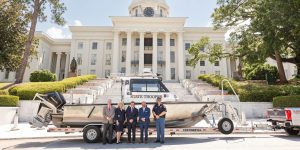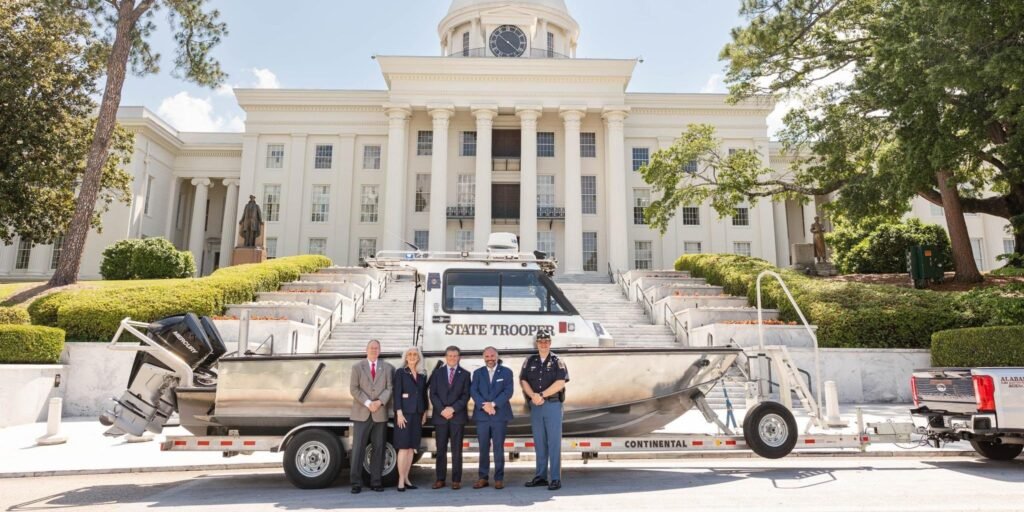
With Memorial Day approaching, the Alabama Law Enforcement Agency announced the state will participate in National Safe Boating Week to promote responsible and careful behavior at the unofficial start of the summer boating season. The agency also detailed two new bills that will help promote safety for boaters in the state.
“The safety of all those enjoying Alabama's waterways is of utmost importance,” said Matt Brooks, ALEA Marine Patrol Division Chief. “Boats can turn sharply with enough force to throw the operator out of the wheelhouse or completely out of the boat, making the boat a deadly hazard to the operator who is thrown out and a danger to others in the area.”
“By requiring operators to use these switches, ALEA aims to prevent these types of accidents and reduce the potential for injury or fatality.”
The legislation Brooks mentioned has been hailed as a “landmark legislative change.” The bill brings state law into line with federal law. The bill requires emergency shutoff switch linkages to be used on covered vessels while the vessel is traveling at or above displacement speed. A covered vessel is defined as a powered vessel that is less than 26 feet in length and has a propulsion system (basically a motor of 3 horsepower or more) capable of producing 115 pounds of static thrust.
This will be mandatory for all vessels constructed after Jan. 1, 2020, or vessels that were already equipped with emergency shut-off switches before or at the time of the passage of federal law. The new requirement is intended to protect boaters and other vessels from runaway boats by ensuring that the engine shuts off immediately if the operator leaves the helm or moves away for any reason.
Col. Jonathan Archer, ALEA Public Safety Director, said one of the agency's primary roles is to ensure safety on the water year-round, not just during the summer boating season.
“We recognize that wakeboarding and wakesurfing are growing in popularity in Alabama,” Archer said. “Through thoughtful regulations, we aim to foster a safe and enjoyable environment for enthusiasts while respecting the needs and concerns of other recreational users. This week, and every week, we aim to promote public safety and save lives on the water.”
The second recently enacted bill strikes a balance between recreation and consideration for other boaters. The law, which took effect on September 1, 2023, regulates wakeboarding and wakesurfing in state waters impounded by Lewis Smith Dam (Lake Lewis Smith), R.L. Harris Dam (Lake Wedowee or R.L. Harris Reservoir), and Shoal Creek in Lauderdale County north of Highway 72. According to the new law, wakeboarding or wakesurfing cannot be engaged between sunset and sunrise in waters less than 400 feet wide, within 200 feet of a shoreline, dock, pier, boathouse, or other structure on impounded waters, and without wearing a U.S. Coast Guard-approved personal flotation device.
Law enforcement will issue warnings for first-time violations until September 1, 2024. Second or subsequent violations within the same calendar year will be treated the same as a first violation with regard to penalties. The penalty for a first violation is a fine of at least $100.
ALEA Executive Director Hal Taylor was sure to thank the state lawmakers involved in passing the bill.
“I would also like to extend my sincere gratitude to the Alabama State Legislature and Governor Kay Ivey for their unwavering support, and especially to State Representatives Ginny Shaver and Ed Oliver, and State Senator Jay Hovey, who made public safety on Alabama’s waterways a top priority during the last legislative session.”
“Their support allows us to continue our mission of ensuring a safe and enjoyable experience for all who navigate our state's beautiful waterways.”
To promote water and boating safety, the Alabama Marine Patrol Division offers the following tips:
1. **Wear a life jacket:** Always wear a U.S. Coast Guard approved life jacket when boating, fishing, or participating in water sports. Make sure the life jacket fits properly and is appropriate for each passenger.
2. **Avoid Alcohol:** Operating a boat under the influence of alcohol or drugs is illegal and greatly increases the risk of an accident. To ensure a safe journey, designate a sober driver or captain.
3. **Check the weather:** Stay informed about weather conditions before heading out on the water. Postpone boating activities if severe weather is expected and be prepared to evacuate if necessary.
4. **Follow navigation rules:** Obey speed limits, maintain a safe distance from other vessels, obey all navigation signs and buoys, practice good boating etiquette and be considerate of other boaters, swimmers and wildlife.
5. **Equip your boat:** Ensure that your boat is properly equipped with essential safety equipment like fire extinguishers, navigation lights, first aid kits, etc. Have your vessel inspected and maintained regularly to prevent mechanical breakdowns.
6. **Get Ready:** Familiarize yourself with local boating regulations and emergency procedures. Carry a charged cell phone or marine radio for emergency communication and let someone on shore know your boating plans.
Austin Shipley is a staff writer for Yellow Hammer News. You can follow him on X. @ShipleyAusten
Do not miss it! Subscribe now Get the top Alabama news stories delivered to your inbox.







